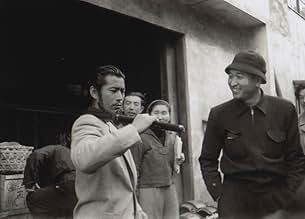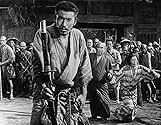Ajouter une intrigue dans votre langueA feature-length documentary about the life and films of legendary actor Toshiro Mifune, weaving together film clips, archival stills, and interviews with such luminaries as Steven Spielberg... Tout lireA feature-length documentary about the life and films of legendary actor Toshiro Mifune, weaving together film clips, archival stills, and interviews with such luminaries as Steven Spielberg and Martin Scorsese. Narrated by Keanu Reeves.A feature-length documentary about the life and films of legendary actor Toshiro Mifune, weaving together film clips, archival stills, and interviews with such luminaries as Steven Spielberg and Martin Scorsese. Narrated by Keanu Reeves.
- Réalisation
- Scénario
- Casting principal
- Récompenses
- 3 nominations au total
- Self
- (as Tadao Sato)
Avis à la une
I should point out that if you want a more biographical look at the man, this may not completely satisfy you. You do learn about his life but I never exactly felt like I truly knew the man as I watched. Instead, it's much more of a filmography and as such highlighted his very best films and discussed them and their impact as well as how Mifune was able to make the most in his performances. In fact, when you do learn personal information, it's mostly negative, such as his very heavy drinking and marital infidelity. I would have loved to hear more from his son, Shiro, in order to learn more about who Toshirô really was off camera. Shiro is featured .but I wanted to hear much more. In addition to interviews with the son, you hear from many actors who worked with him as well as from American directors like Spielberg and Scorsese! Wow you wonder how Okazaki was able to get all this great contributors!
Overall, this is a very well crafted film with lots of beautiful film clips, excellent graphics and editing and is really a must-see for anyone interested in international cinema. It's also a must-see for anyone who loves the films of Akira Kurosawa, as many of their best films were collaborations and are discussed in detail in this lovely documentary.
Toshiro Mifune (1920-1997) was a notable Japanese actor who appeared in more than 150 feature films. Throughout his lifetime he achieved more worldwide fame than any other Japanese actor of the 20th century.
Through stills, archival footage, and interviews - This "Last Samurai" documentary takes a close-up look at the life and career of Toshiro Mifune.
Le saviez-vous
- AnecdotesHisao Kurosawa helped make this documentary. He is the son of legendary director Akira Kurosawa, who often collaborated with Toshirô Mifune.
- Citations
Shirô Mifune: It was his compassion that made him rebellious.
- ConnexionsReferenced in Samâ firumu ni notte (2020)
- Bandes originalesInfra 4
Composed by Max Richter
Performed by Louisa Fuller, Natalia Bonner, Nick Barr, Ian Burdge, Chris Worsey
Courtesy of Deutsche Grammophon GmbH, Hamburg
Under license from Universal Music Enterprises
Meilleurs choix
- How long is Mifune: The Last Samurai?Alimenté par Alexa
Détails
- Date de sortie
- Pays d’origine
- Sites officiels
- Langues
- Aussi connu sous le nom de
- Mifune: The Last Samurai
- Lieux de tournage
- Sociétés de production
- Voir plus de crédits d'entreprise sur IMDbPro
Box-office
- Montant brut aux États-Unis et au Canada
- 62 279 $US
- Week-end de sortie aux États-Unis et au Canada
- 4 296 $US
- 27 nov. 2016
- Montant brut mondial
- 62 279 $US
- Durée1 heure 20 minutes
- Couleur
- Rapport de forme
- 1.66 : 1
- 2.35 : 1
Contribuer à cette page




















